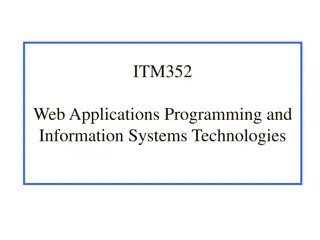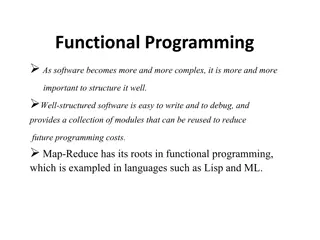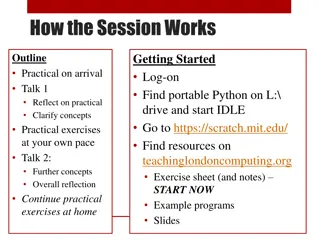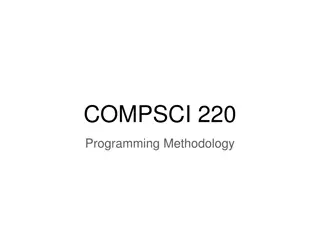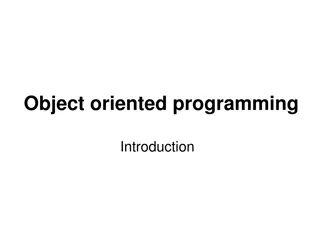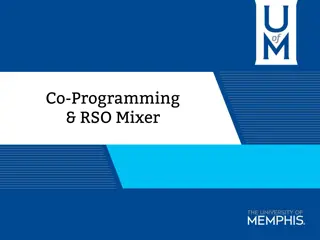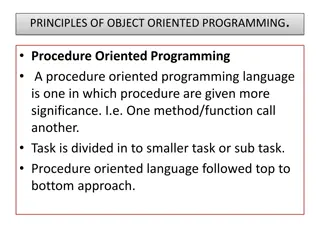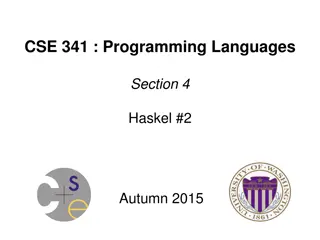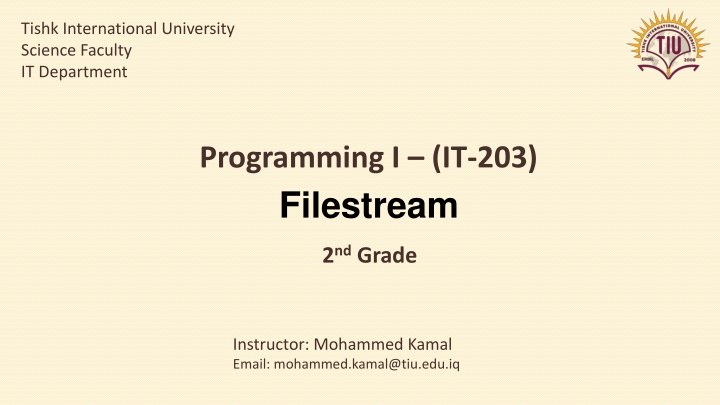
Efficient File Handling Techniques for Programming Students
Learn about file handling in programming, including working with file streams, file objects, opening and closing files, and more. Explore the different types of file stream objects and how to use them effectively in your programs. Master the essential steps for using files and understand the importance of file names in programming. Enhance your skills in reading from and writing to files, and improve your ability to handle errors efficiently. Start using file handling techniques to optimize your programming tasks and enhance your coding capabilities.
Download Presentation

Please find below an Image/Link to download the presentation.
The content on the website is provided AS IS for your information and personal use only. It may not be sold, licensed, or shared on other websites without obtaining consent from the author. If you encounter any issues during the download, it is possible that the publisher has removed the file from their server.
You are allowed to download the files provided on this website for personal or commercial use, subject to the condition that they are used lawfully. All files are the property of their respective owners.
The content on the website is provided AS IS for your information and personal use only. It may not be sold, licensed, or shared on other websites without obtaining consent from the author.
E N D
Presentation Transcript
Tishk International University Science Faculty IT Department Programming I (IT-203) Filestream 2nd Grade Instructor: Mohammed Kamal Email: mohammed.kamal@tiu.edu.iq
Objectives Files Output Formatting Passing File Stream Objects to Functions More Detailed Error Testing Member Functions for Reading and Writing Files
Files A file is a set of data stored on a computer, often on a disk drive Programs can read from, write to files Used in many applications: Word processing Databases Spreadsheets Compilers 3-36
Steps for Using File 1. Open/Create the file 2. Use (read from, write to) the file 3. Close the file 4-36
File Stream Objects Use of files requires file stream objects There are three types of file stream objects (1) ifstream objects: input from file (2) ofstream objects: out to file or create a file (3) fstream objects: used for both input and output 5-36
File Names File name can be a full pathname to file: c:\data\student.txt tells compiler exactly where to look . File name can also be simple name: student.txt this must be in the same directory as the program executable, or in the compiler's default directory 6-36
Opening a File A file is known to the system by its name To use a file, a program needs to connect a suitable stream object to the file. This is known as opening the file Opening a file is achieved through the open member function of a file stream object 7-36
Opening an Input File Opening an input file: ofstream outFile("input.txt"); Can also be done in this way: ofstream outFile; outFile.open("input.txt"); 8-36
The fstream Object fstream object can be used for either input or output fstream file; To use fstream for input, specify ios::in as the second argument to open file.open("myfile.txt",ios::in); To use fstream for output, specify ios::out as the second argument to open file.open("myfile.txt",ios::out); 9-36
Closing a File Traditionally, we close a file when we re done using it: outFile.close(); We can do this explicitly, but C++ streams are automatically closed at the end of the variable s lifetime (typically at the end of the function it is declared in) 10-36
Opening an Input File Opening an input file: ifstream myfile("input.txt"); Can also be done in this way: ifstream myfile; myfile.open("input.txt"); 11-36
Getting File Names from Users Watch out when you re using a string variable to store the filename: string filename = "input.txt"; ofstream myfile(filename);// ERROR Must apply a special conversion first: string filename = "input.txt"; ofstream myfile(filename.c_str()); 12-36
Closing a File Traditionally, we close a file when we re done using it: myfile.close(); We can do this explicitly, but C++ streams are automatically closed at the end of the variable s lifetime (typically at the end of the function it is declared in) 13-36
Opening a File for Input and Output fstream object can be used for both input and output at the same time Create the fstream object and specify both ios::in and ios::out as the second argument to the open member function fstream file; file.open("myfile.txt", ios::in|ios::out); 14-36
File Mode Flags ios::app create new file, or append to end of existing file open for input ios::in ios::out open for output
Default File Open Modes ofstream: open for output only file cannot be read from file created if no file exists file contents erased if file exists ifstream: : open for input only file cannot be written to open fails if file does not exist 16-36
Detecting File Open Errors Two methods for detecting if a file open failed 1) Call fail() on the stream inFile.open("myfile.txt"); if(inFile.fail()) { cout << "Can't open file"; system("pause"); exit(0); } 17-36
Detecting File Open Errors (2) Test the status of the stream using the ! operator inFile.open("myfile"); if(!inFile) { cout << "Can't open file"; system("pause"); exit(0); } 18-36
Insert some data into file #include<iostream> #include<fstream> #include<string> using namespace std; int main() { ifstream fin("abc.txt"); string word; while (!fin.eof()) //to go until end of file and stop { getline(fin, word); cout << word; } fin.close(); system("pause"); return 0; } 19-36
Insert some data into file #include<iostream> #include<fstream> #include<string> using namespace std; int main() { ifstream fin("abc.txt"); string word; if (fin.fail()){ cout << No file inserted " << endl; }else { while (!fin.eof()) { getline(fin, word); cout << word; } fin.close(); } system("pause"); return 0; } 19-36
20-36 Insert some data into file int a=50; double b=4.9; string c ="hello"; myfile << a << b << c << endl;
Insert some data into file ofstream myout; myout.open("nums.out"); for (int i = 0; i < 100; i++) { myout << i << endl; } myout.close(); 21-36
Insert some data from file #include<fstream> voidmain() { ifstream fin("abc.txt"); string word; while(!fin.eof()) //to go until end of file and stop { fin.getline(word); cout<<word; } fin.close(); } 22-36
Insert some data from file int a; double b; string c; myfile >> a >> b >> c; 23-36
Insert some data from file ifstream myfile; myfile.open("abc.txt"); int n; int sum = 0; while (myfile) { myfile >> n; sum += n; } Myfile.close(); 24-36
Insert some data from file ifstream myin; myin.open("nums.txt"); int numbers[100]; for (int i = 0; i < 100; i++) { myin >> numbers[i]; } myin.close(); 25-36
Insert some data from file ifstream myin; myin.open("nums.txt"); String line; while ( getline (myfile,line) ) { cout << line << '\n ; } myfile.close(); 26-36
#include <fstream> ifstream infile; usingnamespace std; infile.open("afile.txt"); intmain () cout << "Reading from the file" << endl; { infile >> data; ofstream outfile; cout << data << endl; outfile.open("afile.txt",ios::app); infile >> data; string data; cout << data << endl; cout << "Writing to the file" << endl; infile.close(); cout << "Enter your name: "; return 0; Cin >>data; } outfile << data << endl; cout << "Enter your age: "; cin >> data; outfile << data << endl; outfile.close(); 27-36
Detecting End of File Reading all integers in a file int x; while (infile >> x) { // read was successful cout >> x; // go to top of loop and // attempt another read } 28-36
Passing File Stream Objects to Functions //print all integers in a file to screen using functions voidprintFile(ifstream &in) { int x; while(in >> x) { cout << x << " "; } } 30-36
Sample of input from file word by word ifstream inFromFile; inFromFile.open("any.txt"); if (!inFromFile) //OR if(inFromFile.fail()) { cout << "File not exist" << endl; system("pause"); exit(0); } string word; while (inFromFile >> word) { cout << word << endl; } 30-36
Sample of input from file line by line ifstream inFromFile; inFromFile.open("any.txt"); if (!inFromFile) //OR if(inFromFile.fail()) { cout << "File not exist" << endl; system("pause"); exit(0); } string getLineByLine; while (getline(inFromFile, getLineByLine)) { cout << getLineByLine << endl; } 31-36
Counting number of lines in the file OR Counting number of words in the file string word; 32-36 string line; int counter = 0; while ( inFromFile>>word) { counter++; cout << word << endl; } cout << Number of words in the file is " << counter << endl; //OR count line counter = 0; while (getline(inFromFile, line)) { counter++; cout << line << endl; } cout << Number of lines in the file is " << counter << endl;
Inserting all data word by word to deque to process on ifstream inFromFile; inFromFile.open("info.txt");// some code string word; deque<string> fileInfo; while (inFromFile >> word) { fileInfo.push_back(word); } 33-36
Inserting all data line by line to deque to process on ifstream inFromFile; inFromFile.open("info.txt");// some code string word; deque<string> fileInfo; while (getline(inFromFile,word)) { fileInfo.push_back(word); } 34-36
Searching in deque String search; cin >> search; for (unsignedint i = 0; i < fileInfo.size(); i++) { if (fileInfo.at(i)==search) {// according to the places of each row info you have cout << "found "<<endl; cout << fileInfo.at(i-2) << "\t"; cout << fileInfo.at(i-1) << "\t"; cout << fileInfo.at(i) << "\t"; cout << fileInfo.at(++i)<<endl; } } 35-36
Delete/Removing a file To remove the file use remove keyword alone after closing the file. #include<iostream> #include<fstream> using namespace std; int main() { ofstream outToFile; outToFile.open("names.txt", ios::app); outToFile << "Ahmed"<< endl; outToFile.close(); remove("names.txt"); 36-36
Delete/Removing a file if( remove( "myfile.txt" ) != 0 ) perror( "Error deleting file" ); else puts( "File successfully deleted" ); 36-36
Always use your creativity to play with filestream with all the other subjects studied so far. END 36-36












